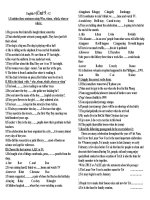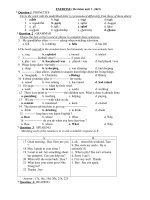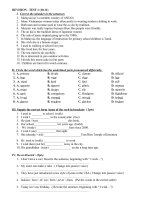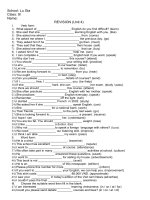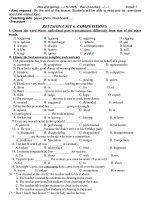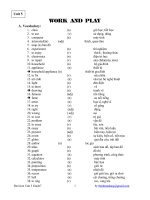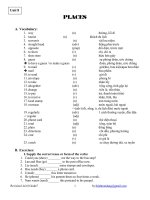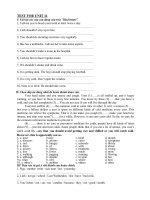REVISION: Unit 7
Bạn đang xem bản rút gọn của tài liệu. Xem và tải ngay bản đầy đủ của tài liệu tại đây (98.99 KB, 10 trang )
<span class='text_page_counter'>(1)</span><div class='page_container' data-page=1>
Full name: ………... Class 9A…
Week 20th REVISION: Unit 7
<b>A.TEACHING POINT</b>
- Some, any
- Modal verbs
<b>B.PRACTICE</b>
<b>I. Complete the sentences with a, a, some, any</b>
1. There is ...banana in the basket.
2. I need ... tea.
3. Are there ... tomatoes in the fridge?
4. We have ... rice, but we don’t have ... meat
5. There’s ... orange on the table.
6. I’d like ... apple juice.
7. He has ...TV and ...computer.
8. Would you like ... ice-cream.
9. I have... friends in Hue.
10. Do you have ...dogs or cats at home?
<b>II.</b> <b>Put the verbs in brackets into the correct tenses of the conditionals.</b>
1. If you (not go) ...away I’ll send for the police.
2. I’ll be very angry If he (make) ... any more mistakes.
3. If he you (be) ...late we’’ll go without him.
4. She will be absolutely furious if she (hear) ...about this.
5. IF you put on the kettle I (make) ... the tea.
6. /if you give my dog a bone he (bury) ... it at once.
7. If we leave the car here it (not be) ... it anybody’s way.
8. He’ll be late for the train if he (not start) ... at once.
9. If you come late they (not let) ... you in.
10. If he go) ...on telling lies nobody will believe a word he says.
<b>III.</b> <b>There is a mistake in the four underlined parts of each sentence. Find the </b>
<b>mistake by circling A,B, C, D</b>
1. someone came into the store, smile and say, “May I help you?If
2. If you try these cosmetics, you look five years younger.
</div>
<span class='text_page_counter'>(2)</span><div class='page_container' data-page=2>
4. I will come to meet Mr. Pike and tell him about your problems if you didn’t solve.
5. Sam will not graduate unless he doesn’t pass all the tests.
6. If there isn’t enough food, we couldn’t continue our journey.
7. Unless you pour oil on water, it will float.
8. You have to take a taxi home if you want to leave now.
9. anyone will phone, tell them I’ll be back at 11: 00If
10. We can hire a minibus if there will be enough people.
<b>IV.</b>Fill each of the numbered blanks in the following passage. Use only one word in each
space.
<b>Aboriginal barbecues recipes cookery espresso food bush</b>
<b>Meat cooking emu</b>
Australia is a huge country and it has a lot of different kinds of
(1...) in the past, the Aboriginal people of Australia ate animals like
crocodiles and some insects like the witchetty grub. Aboriginal Australians travelled
around the Australian countryside, or “bush”. To find food, when the first British and Irish
people moved to Australia in the 1830s, they brought sheep and cows from Europe. They
also brought traditional English and Irish recipes. Many of these (2...),
like fish and chips and (3...) Pies are still popular today. They also
created new Australian recipes such as the Pavlova (a fruit dessert- named after a Russian
dancer) and damper (bread cooked in the bush)
After 1945, a lot of people came to live in Australian from countries like Italy, Germany,
Greece, Thailand and India. They brought recipes with them and Australians began to eat
and drink different things. People started to drink (4...) Coffee and eat
Mediterranean and Asia food.
A lot of modern Australians love (5...) with fresh food. They often
cook food on (6...) in their gardens or on the beach. Today more people
also eat (7...) food like kangaroo and (8...). Marl
Olive, an Aboriginal chef, has a popular TV (9...) programme about
traditional; (10...) food. There are always new recipes to try in Australia!
<b>V.Complete the second sentence in each pair so that it has similar meaning to the </b>
<b>first sentence</b>
1. Vegetarians don’t eat meat.
</div>
<span class='text_page_counter'>(3)</span><div class='page_container' data-page=3>
3. Teachers have to work very hard.
If you are a teacher ...
4. People who do a lot of exercise stay fit and healthy.
If you ...
5. Mechanics understand engines.
If you are ...
6. People who read newspapers know what’s happening in the world.
If you ...
7. Eating healthy foods is very important.
It is ...
8. I suggest having spaghetti and pizza tonight.
Let’s...
</div>
<span class='text_page_counter'>(4)</span><div class='page_container' data-page=4>
Full name: ………. Class 9A…..
Week 21st <b>REVISION: Unit 7</b>
<b>A.</b> <b>TEACHING POINT</b>
- Some, any
- Modal verbs in conditional sentences type 1
<b>B. PRACTICE</b>
<b>I. Complete the sentences with a, an, some, any.</b>
1. I don’t have... paper
2. There isn't ... milk in the jar.
3. She'd like ... orange.
4. . There are ... oranges and bananas.
5. Is there ... meat left?
6. There aren't ... noodles in the bowl.
7. My sister wants ... banana and ... water.
8. I'm hungry. I'd like ... chicken and ... rice.
9. Would you like ... fish?
10. Are there ... vegetables in the fridge?
11. Would you like ... egg for breakfast? ~No, thanks. I'd like ...
glass of juice.
<b>II. Fill in the blanks with: much, many, few, little, most</b>
1. She is very popular. She has ... friends.
2. Ann is very busy these days. She has ... free time.
3. Did you take ... photographs when you were on holiday?
4. I’m not very busy today. I haven’t got ... to do.
5. This is a very modern city. There are ... old buildings.
6. The weather has been very dry recently. We’ve had ... rain.
7. ... English learners are becoming greater and greater.
8. ... people have applied for the job.
9. Did it cost ... to repair the car?
10. ... of many friends live in HCM city.
<b>III. Put the verbs in brackets into the correct tenses of the conditionals.</b>
1. If it (rain)... , the children (not go)... for a walk.
2. If she (not read)... the novel, she (not pass)... the literature
test.
3. If I (not argue)... with my father, he (lend)...me his
motorbike.
4. If we (take)...the bus, we (not arrive)... in time.
5. If Dick (not buy)... the book, his friends (be)...
angry with him.
</div>
<span class='text_page_counter'>(5)</span><div class='page_container' data-page=5>
8. If you (eat)... too much junk food, you (not lose)...
weight.
9. If I (not make)... breakfast tomorrow morning, my girlfriend (not
<b>love)... me anymore.</b>
10. If they (not hurry)... they (not catch)... the train.
<b>IV. Write one word in each gap to complete the sentences.</b>
1. Most people seem to be ... of the harmful effects of their diet.
2. Everyone complemented her ... the wonderful buffet she’d laid on.
3. The problem with drinks like that is they’re full ... sugar.
4. The snack choice was ... fruit salad or chocolate cake.
5. I’m going to to tell you what your supper is. You’ll just have to wait ... see.
6. She’s generally regarded ... being the best cookery book writer of her
generation.
7. Most people associate English food... fish and chips and shepherd’s
pie.
8. Karen’s very careful... how much the salalt she has.
9. There ia a lack ... good restaurants around here.
10. The meat was well cooked, but the sauce was totally lacking ... flavor.
<b>V. Fill in the blanks with a suitable word and then answer the questions</b>
Many health (1...) believe that children and young people today are more
(2...) than they used to be . so why has this happened?
One reason is bad eating habits. (3...) of young people don’t have a healthy
diet. They eat too much fast food (4...) hamburgers and pizza and not
enough fruit and vegetables. In the US, many children have been eating fast
food(5...) since they were very young. In fact, almost one-third of
American children aged four to ninetteen have been eating fast food (6...)
all the time. They also don’t (7...)exercise and spend too
(8...) of their time watching TV, surfing the Internet or playing computer
games.
So how can you change your habits if you have been following an unhealthy lifestyle
for a long time? First, change your (9...) and eat more fruit and vegetables.
Next. Find an activity you enjoy. Why not try something different like rock climbing,
srfing or hiking? Many young people have found that (10...) fit and healthy
can be a lot of fun.
1. What do Many health experts believe?
...
2. Do lots of young people have a healthy diet? Why?
...
3. Which food in the Us have many children been eating?
</div>
<span class='text_page_counter'>(6)</span><div class='page_container' data-page=6>
4. How can you change your habits if you have been following an unhealthy lifestyle
for a long
</div>
<span class='text_page_counter'>(7)</span><div class='page_container' data-page=7>
Week 22 REVISION: Unit 8
<b>A. TEACHING POINT</b>
- A, an, the
- <b>Using the connectives from the list: and, but, because, so, therefore, or, moreover, </b>
however, if, when, unless.
<b>B. PRACTICE</b>
<b>I.</b> <b>Complete the sentences with a, an, the or zero article </b>
1. We are looking for ... place to spend ... night.
2. Please turn off ... lights when you leave ... room.
3. We are looking for people with ... experience.
4. Would you pass me ... salt, please?
5. Can you show me ... way to ... station?
6. She has read ... interesting book.
7. You’ll get ... shock if you touch ... live wire with that screwdriver.
8. Mr. Smith is ... old customer and ... honest man.
9. ... youngest boy has just started going to ... school.
10. Do you go to ... prison to visit him?
11. ... eldest boy is at ... college.
18. I have never seen ________ more beautiful postcards than this.
17. Do the Smiths have _________yellow van?
<b>III. Combine two sentences into one, using the connectives from the list: and, but, because, so,</b>
therefore, or, moreover, however, if, when, unless.
1. You can’t borrow my dictionary. You bring it back on Monday.
...
2. The cost of installation is very high. Solar domestic heating systems are economical to use.
...
3. Solar panels are placed on the roof of a house. The Sun’s energy is used to heat water.
...
4. I don’t agree with a lot of his teaching methods. He is a good teacher.
...
5. We’d better not waste water. We won’t have enough to drink sooner or later.
...
6. The house is quite beautiful. The cost is not too high.
<b>II. Fill in the blanks using “a/an”, “some”, “any” , “much” or “many”.</b>
1. I ate _______ sandwich for lunch.
2. We had _______cake with the tea.
3. I often have_______ fried egg for dinner.
4. There aren’t _________ pears left. Only two.
5. Would you like ________ tea? Yes, please but not too _____ .
6. Don’t eat so _________ chocolate or you’ll get fat.
7. I don’t drink _________ beer. I don’t like it.
8. There is _________tub of margarine in the fridge.
9. The child put ________ sand into the bucket.
10. I can lend you _________ money if you need it
11. There were so ________ jobs to do.
12. Try and find out as _____ information as you can.
13. I have ________ good idea.
14. That's ________ interesting job!
</div>
<span class='text_page_counter'>(8)</span><div class='page_container' data-page=8>
...
7. Do you want to study more? Do you want to look for a job?
...
8. You can go home. You’ve finished this exercise.
...
<b>IV. Finish each of the following sentences in such a way that it means exactly the same as the sentence</b>
printed before it.
1. I am terribly sorry; I thought you were a friend of Anna’s.
I took...
2. Although she was busy, she managed to find the time to proofread for me.
Busy...
3. I would prefer you do computer science.
I’d rather...
4. He didn’t get his visa until last Monday.
It was...
5. They continued to say that I was to blame.
They persisted...
6. Vietnamese coffee is considered to be one of the best in the world
Vietnamese coffee ...
7. If you asked me well in advance, I ‘ll be willing to work overtime.
Provided you ...
8. She listens more sympathetically than anyone else I know.
She is a ...
9. This is the best essay have ever written.
Never...
10. I assumed that she would learn how to take shorthand after this couse.
I took it ...
<b>IV. Use the words or phrases given to write meaningful sentences.</b>
1. Tourism development/lead/soil erosion/pollution/waste.
...
2. Tourism/contribute/increasing carbon footprint/stress/ecosystems.
...
3. The infrastructure/tourist spot/not/satisfy/great demand/during/peak season.
...
4. Tourists/be aware/damage/they /cause/and/tourism authorities/take measures/solve/problems.
...
5. Tourists/cause/significant effect/local habitats/especially/country.
...
</div>
<span class='text_page_counter'>(9)</span><div class='page_container' data-page=9>
Full name: ………. Class 9A…..
Week 23 REVISION: Unit 8
<b>A. TEACHING POINT</b>
- A. an. the
- Relative pronoun
<b>B. PRACTICE</b>
<b>I.</b> <b>Complete the sentences with a, an, the or zero article</b>
1. I like <b>...</b> blue T-shirt over there better than <b>...</b> red one.
2. Their car does 150 miles <b>...</b>hour.
3. Where's <b>...</b> USB drive I lent you last week?
4. Do you still live in <b>...</b> Bristol?
5. Is your mother working in <b>...</b> old office building?
6. Carol's father works as <b>...</b> electrician.
7. The tomatoes are 99 pence <b>...</b> kilo.
8. What do you usually have for <b>...</b> breakfast?
9. Ben has <b>...</b> terrible headache.
10. After this tour you have <b>...</b> whole afternoon free to explore the city.
11. My grandmother likes ………. flowers very much
12. I love …………. flowers in your garden
13. See you on ……… Wednesday.
14. I always listen to ………. radio in the morning
15. Alex goes to work by ……….. bus.
16. Don't be late for ………. school.
17. Listen! Dennis is playing ………. trumpet.
18. We often see our cousins over ………. Easter.
19. She has never been to ……… Alps before.
20. What about going to Australia in ……… February
<b>II. Choose the underlined word ot phrase that needs correcting</b>
1. a drop of oil is placed in a glass of water, it would float to the top.If
2. Tuoi Tre is a daily newsparer that is wide read by both teenagers and adults.The
3. My parents wouldn’t let me stayingup late when I was a child.
4. Her children are used to picking up after school every day. They don’t have to walk home.
5. I ‘musually right about the weather, amn’t I?
6. <b>Could</b> I change seats with you? I’d like sitting next to my friends.
7. Watch television to the exclusion of all other activities is not a healthy habit for a growing child.
8. Hans is only fourteen, but he seemsenough old to stay out until ten,
9. I think that ‘s an interesting thought, isn’t that?
10. <b>Greeting</b> enough sleep is important in ordernot fall asleep is class.
<b>III.</b> <b>Use the word given and other words , complete the second sentences so that it has a similar </b>
<b>meaning to the first sentence</b>
1. Scuba-driving is not really my cup of tea. (<b>INTERESTED</b>)
I ...scube-driving
2. No mountains in Western Europe are highter than Mount Blanc. . (<b>THE</b>)
Mount Blanc...
3. They require special permits to access Son Doong Cave. . (<b>TO</b>)
Special permits...
4. Jane hasn’t decided where to go on holiday. (<b>MIND</b>)
Jane hasn’t... about where to go on holiday.
5. We don’t like travelling during peak season. (<b>INTO</b>)
We ... during peak season.
</div>
<span class='text_page_counter'>(10)</span><div class='page_container' data-page=10>
1. An area of low pressure forms over the land. The heated air expands and rises. (<b>as a result</b>)
...
2. Canada is similar to the United States. The majority of its people speak English. (<b>in that</b>)
...
3. Governments will most probably not relocate entire cities. They are in earthquake zones.
(<b>just because</b>) ...
4. They were forced to buy expensive ones. There were no economy seats available. (<b>so</b>)
...
5. The hypothesis could be tested. Two experiments were conducted. (<b>so that</b>)
...
6. Middle-class families tend to have person-centered structures. Working –class families are usually
positional. (<b>whereas</b>)
...
7. Middle-class children do well in most education systems. Working- class children do relatively
poorly. (<b>on the other hand</b>)
...
8. Western Europe has large reserves of fuel. The UK has a 250-year supply of coal.
(<b>for instance</b>) ...
9. A duck can swim easily and walk on soft ground. It has webbed feet. (<b>so that</b>)
...
10. Far fewer people are killed or injured during train travel. Rail travel is safer than road travel.
(<b>because</b>) ...
11. They recruited very few young engineers.
Hardly ...
12. Jane seems to come to the performance late.
It looks ...
13. I could hold a big party due to Mom’s help.
Had it ...
14. Success depends on hard work.
The harder...
15. Fiona was so disappointed that she could not keep on working.
Such...
16. It was wrong of you to allow a four-year-old child to walk home alone.
</div>
<!--links-->
